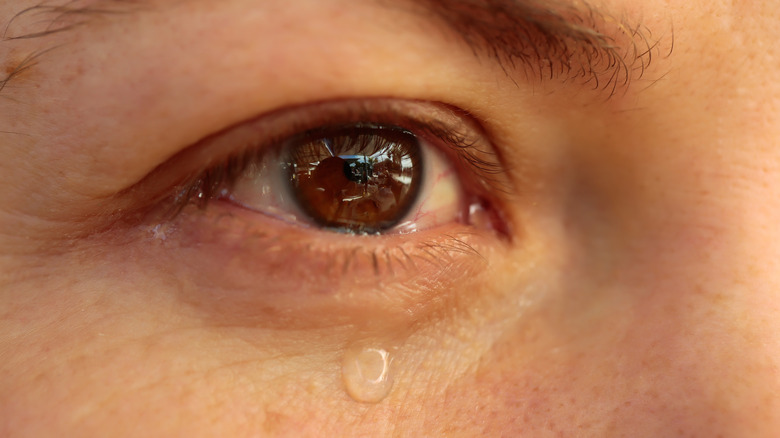The Real Reason Tears Taste Salty
You may not think about tears much, but every time you blink, your eyes create them. Without tears, your eyes would dry out, according to the National Eye Institute. There are three kinds of tears: basal, irritant, and emotional. Basal tears are the types of tears that your eyes use every day to keep your eyes lubricated. Irritant tears are the ones that well up when you cut onions or get something in your eye. Emotional tears are just what they sound like — they are generally the result of strong emotions such as sadness, happiness, or physical pain (via WebMD).
For reasons we don't completely understand, women cry more than men do. Web MD points out that this might be because men have smaller tear ducts. In addition, men's bodies produce less prolactin, a hormone that produces tears. Their bodies also make more testosterone, which may suppress the act of crying. But everybody produces tears, and you may have noticed that they tend to taste salty. Why is that?
Tears contain many compounds, including electrolytes
Tears come from lacrimal glands situated just over your eyeballs, and they contain water, mucus, fatty oils, and more than 1,500 proteins, per Healthline. The salty flavor in tears comes from the electrolytes in the water, which contain salt ions. This fluid is necessary to keep your eyes healthy. Mucus helps lubricate the eyes, and oil in tears keeps tears from evaporating. Mucus and oil are necessary to prevent dry eyes (via Verywell Health).
Emotional tears also contain more stress hormones, according to biochemist Dr. William Frey. Frey told Psychology Today that when the body releases these hormones, it helps relieve stress. In addition, emotional crying may stimulate endorphins, which are the body's natural pain killers. While some people may think that crying makes them look weak, researchers suggest that doing so can relieve negative emotions while holding them back might lead to more mental distress, according to Healthline.


